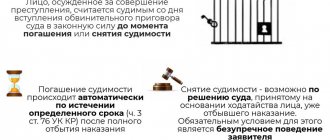The removal of a criminal record through the court is carried out in cases where a person who has already served his sentence wants to be freed from such a specific status before the established period. However, the procedure can only be carried out if a number of conditions are met. If the court meets the applicant halfway and grants the petition, then the legal consequences of the criminal record will be completely annulled. It is true that information that a person has previously served time for a particular crime will, one way or another, be stored in the information database of the Ministry of Internal Affairs. And on an indefinite basis.
The concept of “criminal record”: general information
They talk about a criminal record in cases where a citizen is sentenced to some kind of punishment for committing certain actions that contradict the tenets of the law. According to paragraph 86 of the Criminal Code of the Russian Federation, a person is considered convicted from the moment the relevant authority announces the verdict, or more precisely, from the day the document gains legal force.
Interestingly, a criminal record is not automatically expunged after the period of punishment ends. To completely get rid of this status, you will need to wait more than one year. In this case, the countdown begins precisely from the moment of the official end of the sentence.
At the same time, the presence of an outstanding criminal record entails a number of consequences. First of all, the fact of committing certain illegal actions in the past leaves a rather serious imprint on the entire human life. Most often, society looks at such a citizen with disapproval.
In addition, the factor of an unsealed criminal record is taken into account in case of recidivism, in other words, repeated commission of a crime. And also this point must be taken into account when the next sanctions are imposed for illegal actions. In this case, the preventive measure will be more stringent, and the person will no longer be able to count on an amnesty.
What is indicated in the certificate?
The certificate stating that the criminal record has been expunged shall indicate the following:
- the applicant’s passport details, place of residence;
- name of the authority that issued the document;
- The applicant's full name and date of birth;
- the presence or absence of criminal punishment, when and under what article he was convicted, for what period;
- date and signature of the person who issued the certificate.
Even if the criminal record was cleared a long time ago, the employee who issues the certificate must indicate this. Concealing this information is a malfeasance.
Deadlines for expunging a criminal record by law
A criminal record can only be expunged in full on the basis of the provisions of the law.
Moreover, everything depends on the severity of the offense committed. Clause 3 of paragraph 86 of the Criminal Code of the Russian Federation specifies the following deadlines for the official expungement of a criminal record:
- 12 months for citizens who received a more lenient punishment than imprisonment. Here we are talking about correctional work or compulsory activities.
- 3 years after the expiration of the punishment period for persons who have committed acts of moderate or minor severity. This includes punishment of up to 2 years (minor severity) and up to 5 years (moderate severity).
- 8 years, if we are talking about citizens whose crimes are characterized as serious. For example, major thefts, fraud, battery causing serious damage to health.
- 10 years for persons who have committed particularly serious criminal acts. Here we are talking about murder, sale of narcotic substances, causing lethal injuries, etc.
For minors who have committed a crime, the period for expunging a criminal record is reduced. The rule is established by Article 95 of the Criminal Code.
In this case, the person will not be considered convicted after the following period:
- 6 months after completion of the imposed sentence, if we are not talking about actual imprisonment;
- 12 months, for persons who have committed criminal acts of minor or medium severity;
- 3 years after completion of the punishment established for committing a crime, the category of which is characterized as grave or extremely grave.
But when we are talking about a suspended sentence, in other words, when a person is not deprived of freedom, but certain sanctions are applied to him, here the criminal record is expunged at the end of the probationary period.
What is considered a criminal record and what legal consequences do a criminal record entail?
The legislation states:
- a criminal record is considered a special element of the legal status of a person convicted of an offense. The sentencing is considered the beginning.
- The perpetrator faces certain legal consequences:
- restriction of rights and freedom for a certain time;
- A decision on a suspended sentence made by a court is still considered a criminal record.
Consequences are considered as educational measures for the convicted person; they help in correction. Sometimes the punishment of the guilty person, “softened” by a suspended sentence, is replaced with a harsh sentence.
The legal consequence is:
- a person’s criminal record is an element that aggravates responsibility;
- conviction as a circumstance qualifying the relationship of the offense between the articles of the Code of Criminal Procedure of the Russian Federation;
- conviction is a necessary reason for recognizing an object as a dangerous repeat offender;
- an existing criminal record helps to determine the institution (IK) for deprivation of liberty.
There are also non-legal consequences provided for by law.
For example, if a person is convicted of a financial offense under Article 160, then he may be denied a job related to material assets. A criminal record is attached to a person who has served his sentence until it is expunged or removed in accordance with the established legal procedure.
Is it possible to have a criminal record expunged early?
A criminal record, one way or another, entails a number of certain negative consequences. For example, many structures refuse to hire people who have previously served a sentence. In a sense, such a past leaves an imprint on a person’s entire life, even if he has long since repented.
Therefore, in some cases, it is possible to remove a criminal record after serving a sentence early through the court. It’s true that you can’t just carry out the procedure like that. It will be necessary to prove that the person is worthy of having his status revoked earlier than expected.
The applicant will need to meet the following requirements:
- do not violate the norms of public order, do not get involved;
- conduct a successful work activity;
- repent of committing a crime;
- fully compensate for the damage caused to the victim (if this was stipulated by the verdict);
- do not miss the date of appearance at the Penitentiary Inspectorate (Criminal Execution Inspectorate).
When considering the issue, the court will take into account all the characteristics of the behavior of the former convict. If a citizen has not been involved in dubious matters, behaved impeccably, and regularly complied with the requirements of the law, then the court will grant the petition and the criminal record will be expunged ahead of schedule.
Other methods of expunging a criminal record provided for by the Criminal Code of the Russian Federation
The Criminal Code of the Russian Federation provides for early expungement of a criminal record not only in court. The opportunity to expunge a criminal record is provided by acts of pardon and amnesty (Articles 84, 85 of the Criminal Code of the Russian Federation).
The State Duma issues acts providing for amnesty. The purpose of amnesty acts is to exempt from punishment certain categories of persons who have committed a crime, which provides for the expungement of a criminal record.
The amnesty document indicates persons who are not affected by the amnesty. For citizens who are not well versed in criminal law, this document may not be entirely clear, so for an explanation of all the nuances and subtleties of applying the amnesty, it is better for interested parties to contact a lawyer.
Article 89 of the Constitution of the Russian Federation gives the right of pardon to the President of the Russian Federation alone. A decree of pardon can be issued by the President regarding any convicted person, regardless of how serious the crime he committed was. The pardon procedure also involves submitting a petition and a package of necessary documents indicating correction and awareness of one’s guilt.
Step-by-step algorithm of actions
To have a criminal record annulled early, a person will need to file a petition with the court. Moreover, jurisdiction depends on the severity of the crime. Expungement of convictions for minor offenses is considered by magistrates. But if the request is submitted by a person who has committed theft, robbery, and even more so murder, you should contact the district court at your place of residence.
The general algorithm of the applicant’s actions will be as follows:
- prepare a petition;
- collect documents;
- submit the papers to the judicial authorities.
After receiving the documents, a hearing is scheduled, where, on the basis of Article 400 of the Code of Criminal Procedure, in addition to an oral explanation from the previously convicted person, other interested parties, as well as the prosecutor, if present, can be heard. Be sure to study all the provided characteristics. After which the decision made is announced.
If the court satisfies the request with an appropriate ruling, the document is forwarded to the Criminal Investigation Department and the criminal record is canceled before the due date. In this case, the person is no longer obliged to mention such a fact in his biography, because officially he is not considered to have been prosecuted.
Assistance in expunging a criminal record early in Yekaterinburg
Clearing a criminal record through the court is possible; cases of filing this application are not uncommon for judges, and a positive decision depends on preparation for the process, building a position before the court and collecting all the necessary documents - you can find out more by consulting our lawyer who deals with criminal cases.
Important: if the court refuses to expunge your criminal record, you can always appeal the decision with our help; our lawyers often deal with the issue of appealing the court verdict, and therefore, the accumulated experience will help in carrying out this appeal.
Documentary base
The package of papers, first of all, includes a petition to expunge a criminal record. The form has a standard form and is filled out directly by the submitter. Here you should definitely indicate the grounds for early liquidation of the status and the rationale for your position along with specific arguments.
The following is attached to the application:
- passport;
- a copy of the verdict;
- certificate of execution or completion of the sentence;
- all kinds of characteristics - from the local police officer, from the place of work, from relatives, from neighbors, from the place of study;
- payment documents indicating the fact of compensation for damage caused to victims;
- copies of a marriage certificate, birth of a child, as a factor proving the conduct of a respectable family life;
- an extract indicating the availability of a place of permanent residence.
Also, the package of documents can be supplemented with other papers indicating the impeccable behavior of the former convict. These may be reviews from public organizations where the person is a member. Or, for example, official thanks.
Analysis of judicial practice
Based on the analysis of judicial practice and statistical data from courts, when clearing a criminal record, courts take into account:
- conditional early release from punishment;
- presence of dependent children;
- no violations of public order, no administrative or criminal liability;
- having a permanent place of work;
- category of crimes;
- repentance;
- positive characteristics at the place of residence and work;
- exemplary behavior in everyday life,
- the period of time that has passed since the completion of the sentence.
When refusing to expunge a criminal record, the courts take into account the following circumstances:
- category of crimes, severity and social danger of the committed acts;
- size and type of punishment;
- lack of data on impeccable behavior during the entire period after serving the sentence;
- lack of employment information.
Deadline for going to court
Of course, filing a petition with the court immediately after serving or executing a sentence will not work. Some time must pass so that subsequently the highest authority can be convinced that the person is no longer inclined to commit offenses.
There are no clear deadlines here, but by default the following framework is used:
- half of the probationary period established by the judicial authority for suspended prisoners;
- six months from the expiration of a sentence not related to actual imprisonment;
- 1.5 years, if the period of imprisonment is 5 years, but not more;
- 4 years for cases where the term is from 5 to 10 years;
- minimum 5 years if the person has served a sentence of more than 10 years.
However, despite the fact that in this case the timing plays a fairly large role, first of all, the fact of correction and repentance must be proven. A criminal record will be cleared ahead of schedule only when the court is convinced of this and there is no doubt left in it that the citizen has realized his mistakes and does not intend to return to his former life.
If the application is rejected, the person can apply again with a similar request. But you can make another attempt only after 12 months.
What you need to know about expunging a criminal record
Criminal record is a criminal legal category. This is a consequence of being convicted of a crime. The main thing that a criminal record influences is the assignment of punishment: all other things being equal, a criminal with a criminal record, especially for a similar crime, receives a greater punishment than without a criminal record. In ordinary life, having a criminal record affects the ability to exercise one’s civil rights. This is always a negative characteristic point, which generally affects the reputation.
A person is considered to have a criminal record until the criminal record is automatically expunged after a specified period or removed in court. It's official. But the problem is that information about a criminal record is permanently entered into the Ministry of Internal Affairs database, and removal or expungement does not delete this information. That is, even if you get rid of your criminal record and its consequences in the criminal legal sense, this “stain” will still remain in your biography. When you receive a certificate of presence/absence of a criminal record, it will contain all the data, and it is impossible to “erase” it from the database. Because of this, expunging a criminal record is only advisable if you need to remove the restrictions associated with its presence, and not just “clean up” your reputation. That is why a relatively small number of citizens resort to expunging their criminal record. From the point of view of the law, you will not be judged, but in fact, yes.
As a rule, people have their criminal record expunged early if they want to:
- apply for a position where the law prohibits having an outstanding or unexpunged conviction;
- enter military service under a contract;
- become a candidate in elections;
- obtain a hunting license and (or) a weapons license;
- become a guardian (adoptive parent);
- go to a country where people with a criminal record are not allowed.
Commentary on Article 400 of the Code of Criminal Procedure of the Russian Federation
1. According to Art. 86 of the Criminal Code, a person convicted of committing a crime is considered to have a criminal record from the day the court’s conviction enters into legal force until the criminal record is expunged or removed. A person released from punishment is considered to have no criminal record.
2. If the convicted person behaved impeccably after serving his sentence, then, at his request, the court may remove his criminal record before the expiration of the criminal record. Expungement or expungement of a criminal record cancels all legal consequences associated with a criminal record.
3. The question of expunging a criminal record in accordance with Art. 86 of the Criminal Code, based on the provisions of Part 1 of the commented article, is resolved by the district (garrison military) court, as well as the magistrate in criminal cases within its jurisdiction, at the place of residence of the person who has served his sentence, at the request of this person <1864>. ——————————— <1864> See: Resolution of the Plenum of the Supreme Court of the Russian Federation dated December 20, 2011 N 21 “On the practice of courts’ application of legislation on the execution of sentences” // Russian newspaper. 2011. December 30.
4. If, after at least half of the established probationary period, the convicted serviceman has proven his correction, the command of the military unit may petition the court to revoke the suspended sentence and expunge his criminal record.
5. For a convicted person who has proven his correction by exemplary behavior before the expiration of the probationary period, the judge of the district court, as well as the magistrate in cases within the jurisdiction of the magistrate, may revoke the conditional sentence and remove his criminal record after the expiration of at least half of the established probationary period.
6. The judge, having established that the convicted person, who was denied by the court to expunge his criminal record, filed a second petition earlier than the deadline established by Part 5 of the commented article, makes a decision to refuse to accept the petition and returns it to the person who served his sentence <1865>. ——————————— <1865> By analogy. See: Ibid.
7. See also commentary to Art. 152 of the Code of Criminal Procedure of Russia.









